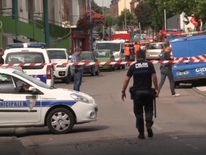The US has warned North Korea that it faces "real consequences" over its continuing nuclear and missile tests.
Tensions have risen since Pyongyang carried out its fourth nuclear test in January, followed by a series of missile launches - the latest was last week - which analysts say show it is making progress towards being able to strike the US mainland.
At a meeting of the 10-members of the Association of Southeast Asian Nations (ASEAN), US Secretary of State John Kerry said: "Together we are determined ... to make absolutely certain that DPRK (North Korea) understands that there are real consequences for these actions."
The issue is a major theme of talks in the Laotian capital, which are attended by 10 Southeast Asian nations and key players in the region including China, the US, Russia, Japan and South Korea.
Mr Kerry continued: "(The) issue that came up in nearly every meeting I had so far this week is the provocative and deeply concerning behaviour of the DPRK.
"North Korea's actions present a very serious threat, not just to this region but to international peace and security."
John Kerry (L) with South Korean foreign minister Yun Byung-se at the talks
UN sanctions against North Korea have been tightened following the tests but Pyongyang has defiantly continued with its programme.
Washington and Seoul agreed earlier this month to deploy a sophisticated anti-missile system in South Korea, which can shoot down incoming enemy projectiles.
That, in turn, is worrying Beijing and Russia who are unhappy about having a US-made system so close to their territory.
Beijing is Pyongyang's main friend, both diplomatically and economically, but reports say even it seems to be growing impatient at its neighbour's refusal to pull back on its tests.
North Korea's new foreign minister and former nuclear negotiator Ri Yong-Ho has met his Chinese counterpart Yi - but is seen as unlikely that Mr Kerry and Mr Ri will meet.
But a US State Department official emphasised: "I think that the North Korean foreign minister will again hear from not only the Secretary of State but from others in the room that the world is not prepared to accept North Korea as a nuclear state."




